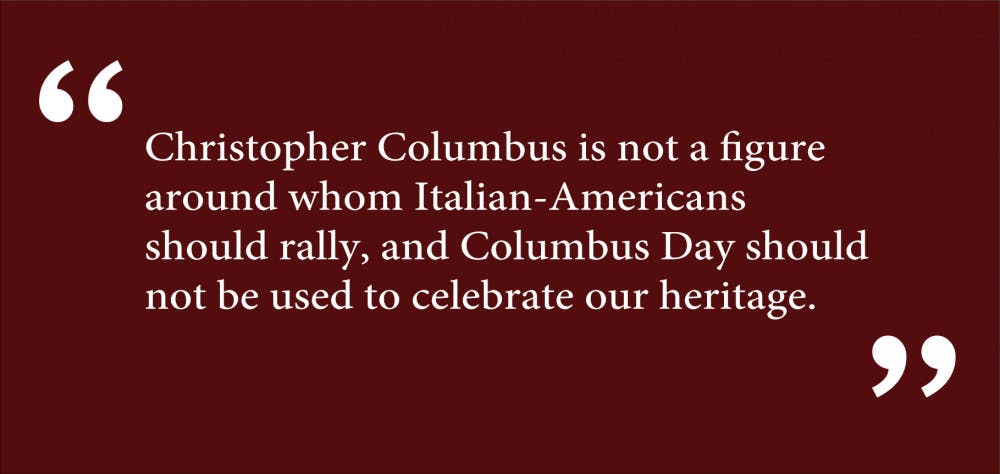From New York to Kenosha, people came together on Columbus Day to honor their Italian-American heritage. In a Facebook group dedicated to the Italian-American roots of Massachusetts’ Merrimack Valley, where I am from, people discussed going to their local Sons of Italy lodges to celebrate. Despite my misleadingly Irish surname, three sets of my great-grandparents immigrated to the United States from Italy (specifically Naples and Sicily, to establish my regional ties). I grew up eating cannoli, crispelli and crusty Italian bread. On Labor Day weekends, I would often go to a local feast for three Italian saints. I feel connected to my ancestors’ homeland. And as an Italian-American, I am troubled that Columbus Day is being interpreted as a celebration of our culture.
Christopher Columbus is not a figure around whom Italian-Americans should rally, and Columbus Day should not be used to celebrate our heritage. We should not be heroizing a man responsible for the enslavement and murder of countless indigenous peoples.
There are many arguments already written about how Columbus Day celebrates colonialism and the oppression of the peoples who first settled the Americas. I have nothing novel to contribute to the general discussion of why Indigenous Peoples’ Day would be a more appropriate celebration. Instead, I am focused on why Italian-Americans should disentangle ourselves from Columbus Day.
The major argument in favor of Columbus Day being a day for celebrating Italian-American heritage comes from its roots as a holiday. It was first celebrated in 1892, in the midst of the largest period of Italian immigration to the United States. As recent immigrants, Italians in the late nineteenth and early twentieth centuries faced xenophobia, as exemplified in the high-profile Sacco and Vanzetti executions. Thus, Columbus became a figure around which newly-arrived Italians could rally to celebrate their connection with their new country and counter the discrimination they faced as immigrants.
It is understandable why Columbus held such importance to early Italian-Americans: Though Columbus never set foot in North America, nor did he have any conception of an Italian-American identity, he was the best-known person of Italian heritage to have made a significant contribution to American history. For recent immigrants, his image tied together two disparate cultures.
Recalling that history of anti-Italian bias in America allows us to recognize the discrimination that has long been leveled against immigrants. Yet, recognition of the troubles that Italian-Americans faced in the past should be tempered with the acknowledgment that those troubles are no longer with us today. White Italian-Americans receive the same benefits from their race as do Americans of Anglo-Saxon descent. And, critically, Italian-Americans benefit as much as anyone else from the colonization that Columbus ushered in. We all — and to be explicitly clear, I am including myself in this statement — live on land that was stolen from its original inhabitants. That we share an ethnicity with the first thief is not something to be proud of.
The reasons behind Columbus’ importance as a figurehead are logical. But understanding why our ancestors acted in certain ways does not mean that we have to value the same things that they did. Columbus has increasingly been recognized for his violence toward indigenous peoples, a fact that has historically been omitted in the conversations that Italian-Americans have held about him. We can do better than our progenitors. We can find sources of pride that do not come with brutal violence attached to them.
And indeed, Italian-Americans have plenty of cultural points of pride that have nothing to do with Columbus. I referenced going to an Italian feast when I was younger. The Feast of the Three Saints honors three martyred Sicilian brothers. Though the feast is inarguably a religious festival, it functions more broadly as a celebration of the Italian immigrant heritage of the city in which it is held. The crafts, the food and even coming together to cheer on the procession of the saints offers as much to religious Italian-Americans as it does to the more secular among us, including myself. Other feasts take place in other historically Italian neighborhoods, such as the Fisherman’s Feast, held yearly in Boston’s North End. And there are now innumerable important Italian-Americans, ranging from authors to scientists to politicians, for us to celebrate. Why waste time defending a murderer when we could be uplifting lesser-known figures?
At this year’s Columbus Day Parade in New York, Mayor Bill de Blasio said, “You can debate the historical figure of Christopher Columbus, but you can’t debate the contribution of Italian-Americans to this country. That is beyond question.” What de Blasio fails to recognize is that Columbus does not have to represent those contributions. As long as he does, our heritage will be tied to the suffering that indigenous peoples endured, and continue to experience, at the hands of European settlers. I cannot speak for de Blasio, but I personally find nothing to be proud of there.
Caroline Mulligan ’19 can be reached at caroline_mulligan@brown.edu. Please send responses to this opinion to letters@browndailyherald.com and other op-eds to opinions@browndailyherald.com.



